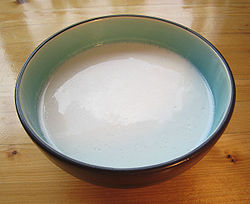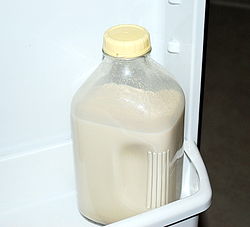- Plant milk
-
Plant milk is a general term for any milk-like product that is derived from a plant source. There is no formal or legal definition for plant milk. The most popular variety is soy milk.[1]
There are a variety of reasons for consuming plant milk including lactose intolerance and milk allergy, religious/spiritual reasons, simple taste preference, veganism and ovo-vegetarianism, and health conditions such as PKU—a rare genetic disorder requiring a low-phenylalanine diet—that makes digestion of animal proteins, especially casein found in dairy, difficult or impossible. After soy, rice and almond milk are the most common non-dairy milks in the USA, oat milk is the second most common plant milk in Europe, sold even in average supermarkets (in opposite to almond milk, which is very expensive, and only found in health food stores). There is also coconut milk, hazelnut milk and milk from peas and lupin.[1]
Contents
Grain milk
Legumes-based milk
- Lupin milk
- Pea milk
- Peanut milk
- Soy milk
Nut milk
- Almond milk
- Cashew milk
- Coconut milk
- Hazelnut milk
Seed milk
- Hemp milk
- Quinoa milk
- Sesame seed milk
- Sunflower seed milk
See also
- Health food
- Plant cream
- Wikibooks Cookbook category for Nut and Grain Milk recipes
- The China Study
Notes
Milk substitutes Types Almond milk • Coconut milk • Grain milk • Hemp milk • Peanut milk • Plant milk • Rice milk • Soy milkOther beverages Other dairy analogues Brands 8th Continent • Alpro • Cool Whip • MimicCreme • Silk • So Good • Tofutti • Turtle Mountain • Vitasoy • Yeo Hiap SengCategories:- Milk substitutes
- Vegan cuisine
Wikimedia Foundation. 2010.




